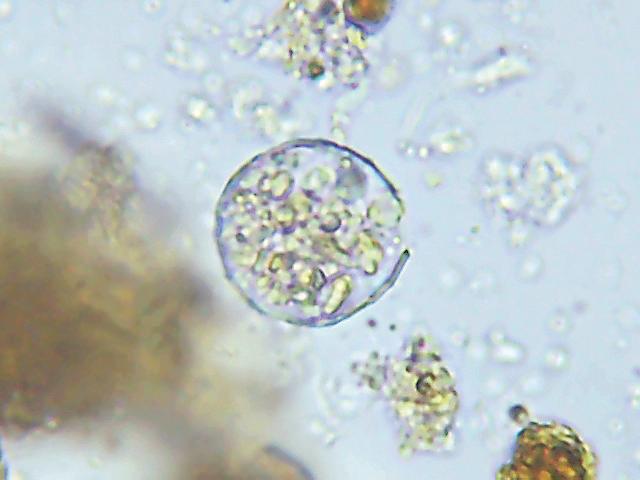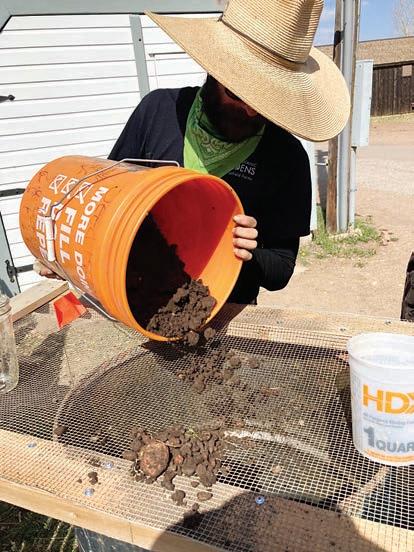
3 minute read
SOIL HEALTH
FROM PAGE 6 those nutrients through a web of fungi. Fungal networks expand the reach of roots and create highways inside root hairs. As satis ed plants then release ‘exudates,’ which attract more bacteria and fungi, the cycle continues. Without these characters to play their parts, soil turns into lifeless dirt.
Conventional soil management has disrupted the soil ecosystem. Without microscopic predators, bacteria or fungi to assist plant roots, a domestic violence situation. Little did I know that this decision would not only provide me with a ordable housing and education opportunities, but also vital mental health services.
Before coming to Warren Village, I had already earned a certi cate in medical assisting, but was struggling to make ends meet. I saw the nonpro t as an opportunity to not only continue my education and pay low rent, but also access a range of services such as career development, housing and personal nance, child development and, of course, mental health counseling.
It was just before COVID-19 struck that I began meeting with Pam, a to virtual sessions. Despite the challenges, this counseling proved to be life-changing for me. I was diagnosed with PTSD and ADHD, and being able to work with a professional to organize my thoughts and feelings was a game-changer.

Since leaving Warren Village, I now own a home and possess the necessary resilience and coping skills to prioritize other aspects of my life, such as decorating my new house and providing my daughter with quality possessions without relying on government aid. I consider myself lucky to continue receiving help from Pam through regular counseling sessions, and I will always be appreciative to Warren Village for to prioritize your mental well-being. e recent pandemic has taken a toll on all of us, but particularly those who were already struggling with psychological issues. are available so the child can thrive through their situation. We know that youth with a CASA: that aren’t washed away are consumed by a monoculture of bacteria, reproducing rapidly and unchecked by predators. Without predators to consume bacteria, the soil ecosystem becomes unbalanced. e resulting population of diseasecausing bacteria release greenhouse gases into the atmosphere. rough the eyes of a microscope, a farmer can witness the soil ecosystem in action, but studying soil ecology doesn’t require a microscope. Diversity in critters — worms,
So I urge all of us to take the time this month to focus on our mental health and well-being. It is not always easy to prioritize ourselves, but it is crucial to living a healthy and ful lling life. Seek help now instead of potentially having problems compound over time.
Let us remember that mental health is just as important as physical health, and work towards ending the stigma and ensuring that everyone has access to the care they need.
• Have signi cantly fewer placements and are less likely to re-enter the child welfare system.
• Have higher academic performance.
• Have improved behavior and selfcontrol.
Realistically, not all farmers have the time to study microscopy.

• Have improved overall wellbeing.
• Are less likely to turn to delinquency and crime.
In Colorado, nearly 5,000 children were served through the 18 CASA programs by nearly 2,000 CASA advocates. Even with these numbers, there are many children navigating these situations without a CASA volunteer. ere are ve metro area CASA organizations that provide services in Adams, Arapahoe, Boulder, Broom eld, Denver, Douglas, Elbert, Gilpin, Je erson and Lincoln
Even without a microscope, understanding what healthy soil looks, feels and smells like can inform better practices. Undisturbed soil will evolve with its plant inhabitants. Rich brown, textured soil that smells like a forest will feed a vegetable plant on its own, without nutrient additives. A calculated ‘less is more’ soil management approach gives our soil a chance to breathe.
Regenerative agriculture rede nes the farmers’ relationship with nature. Humans’ senses have evolved with plants — the smell of healthy soil triggers serotonin production in counties. ese organizations provide a number of additional donated resources like school supplies, holiday gifts, tickets for outings, and gift cards for groceries, retail and restaurants.
It’s time to invest in our communities’ future with a collective power of one. You can be the one. You can:
• Give your time and be a voice for these children.
• Be a champion and cheerleader — we all need one at some point, especially a child.
• Build their con dence and self- the human brain. Alternatively, our negative reaction to the putrid smell of greenhouse gases produced by harmful bacteria warns us of toxicity. ese ne-tuned deep intuitions can become regenerative farmer’s almanac. worth.
By working in tandem with natural soil ecosystems, farmers can reduce the labor and expenses of disruptive soil tillage and chemical fertilizer application. Soil naturally wants to grow plants. By accepting help from nature, farmers can grow healthier plants more e ciently.
Rutger Meyers is a soil health technician for the Denver Botanic Gardens.

• Be a role model.
You can make a di erence in the future of our community by lifting these children up, guiding them on their journey and being the one stable in uence in their lives at a critical time of need.
We cannot underestimate the power one person can have, especially for our most vulnerable children. at’s essential and anything but cliché.







